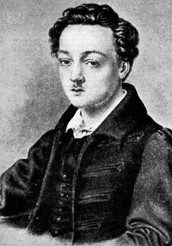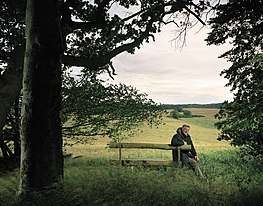Georg Büchner Prize
The Georg Büchner Prize (German: Georg-Büchner-Preis) is the most important literary prize for the German language, along with the Goethe Prize. The award is named after Georg Büchner, author of Woyzeck. The Georg Büchner Prize is awarded annually for authors "writing in the German language who have notably emerged through their oeuvre as essential contributors to the shaping of contemporary German cultural life".[1]
| Georg Büchner Prize | |
|---|---|
 | |
| Awarded for | authors writing in the German language whose work is considered especially meritorious and who have made a significant contribution to contemporary German culture |
| Location | Darmstadt |
| Country | Germany |
| Presented by | Deutsche Akademie für Sprache und Dichtung |
| Reward(s) | €50,000 |
| First awarded | 1923 |
| Website | www |
History
The Georg Büchner Prize was created in 1923 in memory of Georg Büchner and was only given to artists who came from or were closely tied to Büchner's home of Hesse. It was first awarded in 1923. Among the early recipients were mostly visual artists, poets, actors, and singers.[2]
In 1951, the prize changed to a general literary prize, awarded annually by the Deutsche Akademie für Sprache und Dichtung. It goes to German language authors, and the annual speech by the recipient takes place in Darmstadt. Since 2002, the prize has been endowed with €50,000.
The Georg Büchner Prize and the Nobel Prize in Literature
Five winners of the Georg Büchner Prize, Günter Grass (1965), Heinrich Böll (1967), Elias Canetti (1972), Peter Handke (1973) and Elfriede Jelinek (1998) were awarded the Nobel Prize in Literature in subsequent years. The Georg Büchner Prize is frequently seen as an indicator for potential future Nobel Prize winners writing in the German language. Most recently, however, the Swedish Academy in Stockholm preceded the German Academy for Language and Literature in awarding a prolific writer from the German sprachraum. Herta Müller received the Nobel Prize in Literature but has not yet been awarded the Georg Büchner Prize.[3]
Recipients of the literary prize, since 1951

Recipients 1923–50
- 1923 Adam Karrillon (1853–1938) and Arnold Mendelssohn (1855–1933)
- 1924 Alfred Bock (1859–1932) and Paul Thesing (1882–1954)
- 1925 Wilhelm Michel (1877–1942) and Rudolf Koch (1876–1934)
- 1926 Christian Heinrich Kleukens (1880–1954) and Wilhelm Petersen (1890–1957)
- 1927 Kasimir Edschmid (1890–1966) and Johannes Bischoff (1890–1957)
- 1928 Richard Hoelscher (1867–1943) and Well Habicht (1884–1966)
- 1929 Carl Zuckmayer (1896–1977) and Adam Antes (1891–1984)
- 1930 Nikolaus Schwarzkopf (1884–1962) and Johannes Lippmann (1858–1935)
- 1931 Alexander Posch (1890–1950) and Hans Simon (1897–1982)
- 1932 Albert H. Rausch (1882–1949) and Adolf Bode (1904–1970)
- 1933–44 not given
- 1945 Hans Schiebelhuth (1895–1944)
- 1946 Fritz Usinger (1895–1982)
- 1947 Anna Seghers (1900–83)
- 1948 Hermann Heiss (1897–1967)
- 1949 Carl Gunschmann (1895–1984)
- 1950 Elisabeth Langgässer (1899–1950)
Notes
- "Georg-Büchner-Preis". Translated from Deutsche Akademie für Sprache und Dichtung. Retrieved 31 May 2012.
- "Georg-Büchner-Preis". Deutsche Akademie für Sprache und Dichtung. Retrieved 31 May 2012.
- Leinen, Angela (29 October 2011). "Wie man den Büchnerpreis gewinnt". taz (in German). Berlin. Retrieved 23 November 2019.
- "Sibylle Lewitscharoff wins 2013 Georg Büchner prize". Deutsche Welle. 4 June 2013. Retrieved June 5, 2013.
- "Rainald Goetz: Top German literature prize goes to edgy ex-doctor". Deutsche Welle. 8 July 2015. Retrieved 9 July 2015.
- "Top German literature prize goes to Marcel Beyer". Deutsche Welle. 28 June 2016. Retrieved 29 June 2016.
- "Lyriker Jan Wagner erhält Georg-Büchner-Preis". Spiegel Online. 20 June 2017. Retrieved 20 June 2017.
- "Terézia Mora bekommt Georg-Büchner-Preis". Spiegel Online. 3 July 2018. Retrieved 3 July 2018.
- Radisch, Iris (10 July 2019). "Traurig über seine eigenen Einsichten". Die Zeit (in German). Hamburg. Retrieved 11 July 2019.
External links
- Georg-Büchner-Preis, official site (in German)